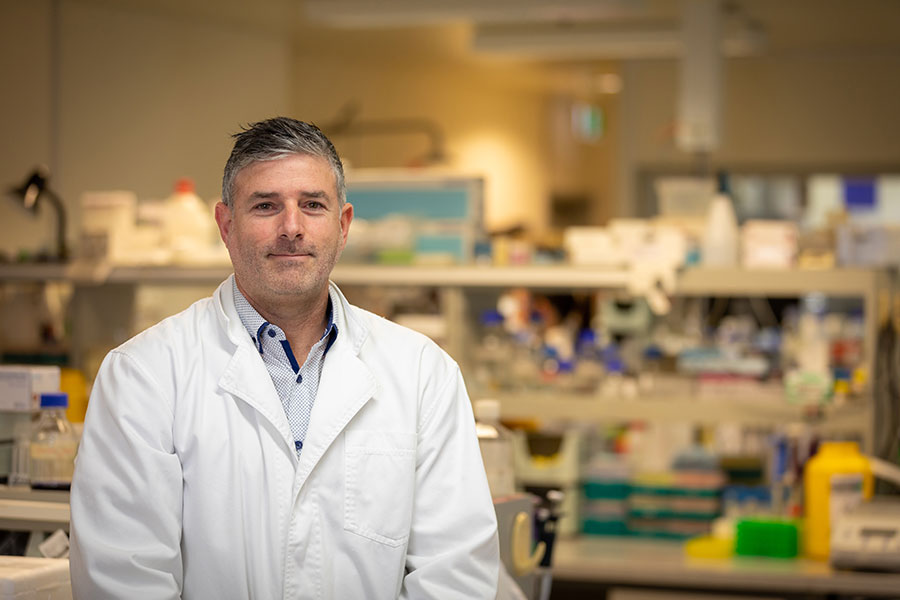Researcher Highlights
Spotlighting male infertility to boost IVF success
By examining the biological factors of male infertility, Dr Geoffry De Iuliis’ work is helping to create new hope for millions of men and women struggling to conceive.

Infertility rates across the developed world are on the rise. Around one in six Australian couples will experience fertility problems, and Dr Geoffry De Iuliis warns that a decline in sperm count and quality is part of the problem.
To inform new solutions, Geoff and his research team are investigating the underlying causes of male infertility. This research, he explains, is more important than ever, especially as increasing numbers of Australians turn to assisted reproductive technologies like IVF for support.
“My research team asks questions such as, how and why does infertility occur in some men and how can we effectively treat those men?”
“By increasing our understanding of male infertility, we hope to develop better IVF practices, such as better ways of selecting the best possible cells to use in IVF. We also hope to be in a position where we can make recommendations on lifestyle that will improve fertility.”
World-renowned fertility research
With a strong background in chemistry, Geoff works alongside a highly skilled research team to examine the structure and biochemistry of the molecules that make up a sperm cell. The team then looks at how these cells might be damaged or break down in poor-quality sperm.
“I am very fortunate to have started my research career in a world-renowned reproductive science laboratory at the University of Newcastle, which continues to give me a fantastic platform to contribute knowledge on sperm cell biology.”
“So far, we have made great headway in understanding how sperm DNA can become damaged and the changes in biochemistry that degrade men’s sperm quality.”
Over the years, Geoff’s work has led to significant breakthroughs in our understanding of male factor infertility. For example, his work helped to clarify how chemical imbalances between free radicals and antioxidants in the body, known as “oxidative stress”, can lead to cell and tissue damage. Geoff suspects that oxidative stress is contributing to rising incidences of infertility within the male population.
“This stress, which is commonly seen in sub-fertile men, is responsible for damaging important molecules in sperm, including the paternal DNA.”
With a better understanding of the science behind male reproductive issues, Geoff and his team hope to aid global efforts in halting the increasing rates of male infertility and see more babies born healthy and strong.
“We want to reduce male infertility and improve outcomes for people undergoing assisted reproduction therapies. Our work also has important implications for ensuring the good health of children born from assisted reproductive procedures.”
As well as supporting improved human health, Geoff’s work also translates across to better fertility outcomes for some of our four-legged friends. The team’s reproductive science discoveries are also highly valued within the field of agriculture, providing insights to support healthy Australian livestock.
“Many processes of sperm biology are similar across mammalian species. This gives us the advantage of working with other species and contributing to the animal reproduction space, servicing both conservation and livestock programs.”
The mobile phone effect
For their most recent work, Geoff and his team are exploring how low energy radiation, such as the energy from mobile phones, can affect and damage sperm cells. Their research shows that this low energy radiation in the environment has a potential to impact health. However, Geoffry notes that more research is still needed.
“This low-level electromagnetic energy is the same medium that is used in mobile device communication, including 3, 4 and 5G and WiFi. In the laboratory, the effects we see from this energy on sperm are very clear; however, out in the environment, the effects are much more subtle. Hopefully this means that there are no risks to human health at all, but we can’t be certain.”
“Either way, we believe that people would rather know the truth. Which is why we are working at finding answers.”
Results from their work would not only help to progress reproductive health treatments, they would also serve as a useful model towards understanding how this type of energy may interact with other cells and tissues in general—something that is not currently known.
“Gaining this knowledge is critical towards informing any potential health risks for the public.”
Hope for prospective parents
Geoff’s research group works closely with IVF professionals from all over the world, allowing them to turn their ideas and learnings into real-world solutions for patients in the Hunter region, nationally and globally.
“As a born and bred Novocastrian, I am very proud to be part of Newcastle’s sustained global profile in reproductive science. I love the challenge of attacking a new scientific problem.”
Geoff shares that his work is also motivated by the personal experience of seeing friends and family struggle with infertility. For Geoff, there is no better feeling than knowing his research is helping to create new hope and new life.
“It must be incredibly difficult to find out that you may have trouble conceiving a child, and some of my friends have experienced this ordeal.”
“To be able to contribute, even in a small way, to improving fertility outcomes for people is pretty satisfying and keeps us pushing forward.”
The University of Newcastle acknowledges the traditional custodians of the lands within our footprint areas: Awabakal, Darkinjung, Biripai, Worimi, Wonnarua, and Eora Nations. We also pay respect to the wisdom of our Elders past and present.
